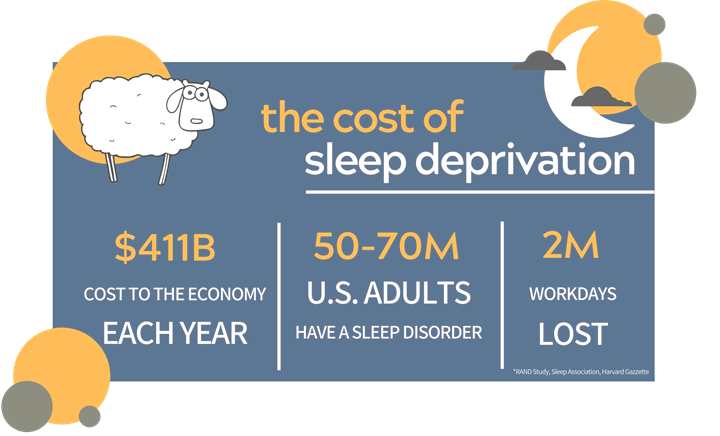Wellness Matters: The Impact of Too Little Sleep
We have an abundance of activity in our modern culture: places to go, jobs to do, texts to return and appointments to keep. Not to mention, kids to raise and household chores!
One thing many of us do NOT have an abundance of is sleep. And while it may feel like a lack of sleep equates to simply needing a little extra caffeine in the morning, it’s proving to be costly -- both physically and economically.

At an individual level, the financial cost of sleep deprivation is felt by:
- Reducing income potential due to missed work days and ineffective job performance
- Seeking treatment for resulting health issues, increasing health care costs for those suffering from sleep loss
The overall economic impact -- which translates to $411 BILLION lost each year -- is underscored by how getting too little sleep effects individual health. Sleep deprivation has been associated with costly chronic illnesses like type 2 diabetes, coronary heart disease and depression. It’s also tied to:
- Obesity
- Fatigue
- High blood pressure
- Cognitive issues and memory decline
- Likelihood of being involved in an accident or work related injury
In fact, the evidence is so strong that a lack of sleep is tied to poorer health outcomes that the CDC declared it a “public health problem” in 2014.
Why Sleep Matters
The average U.S. adult gets less than what is recommended as healthy sleep: a full 8 hours minimum. In fact, the average is 6.5 hours! That lack of sleep (or poor quality) increases the risk of developing serious health issues.
So, what are some of the protective benefits of sleep that help mitigate these issues? Studies show there are many:
- Hormone Regulation: The sleep-wake cycle, along with sleep quality and duration, influence the hormones that impact appetite control, blood sugar regulation and metabolism.
- Heart Health: When we sleep, our blood pressure decreases and allows the vessels of the heart to “relax” a bit, alleviating strain on the arteries. Hormone regulation, influenced by sleep, also impacts heart health.
- Cognitive Health: As we sleep, the connections between brain cells are strengthened, information moves from “short term memory” to “long term memory”, and memories are reactivated.
- Mental Health: A 2017 study concluded that a lack of sleep or insomnia may actually be a cause of, or contributor to mental health issues rather than a side-effect.
Getting Your Best Sleep
Are you among the majority of people who aren't getting enough sleep? Or maybe you're someone who gets enough hours...but wake up tired, feeling groggy and sluggish the next day?
Here are some tips and tricks to help you improve your sleep quality -- something equally important to how many hours we sleep: